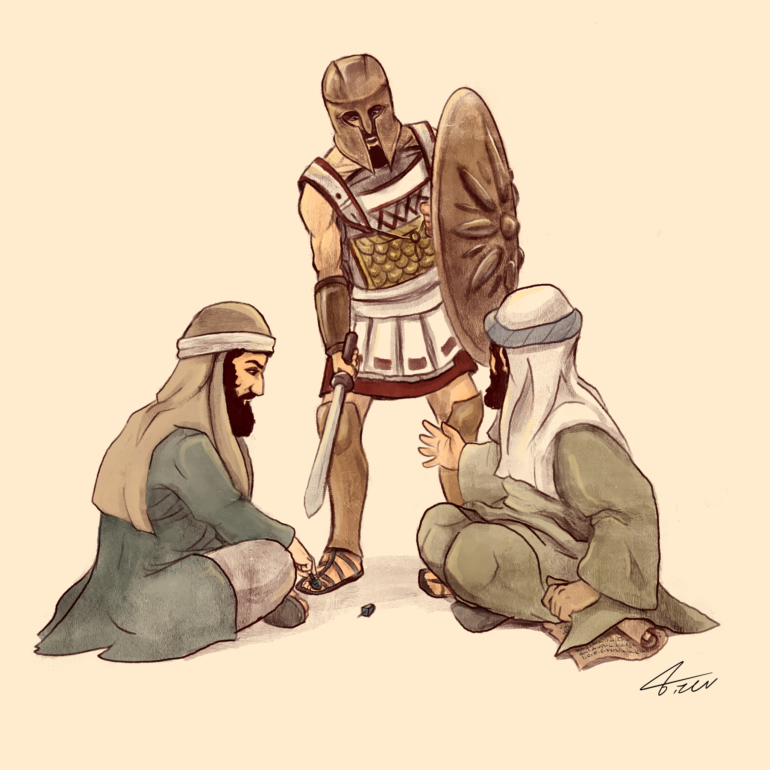The fourteenth chapter of a podcast series on the first Book of Maccabees.
For more content from VISION Magazine, subscribe to our newsletter and follow us on Twitter @VISION_Mag_, Facebook and YouTube. If you haven’t already, don’t forget to subscribe to our podcast on SoundCloud, iTunes, Stitcher, TuneIn, or Spotify and leave a rating and review to help us get our message out to a wider audience!
To support the podcast, head over to our PayPal portal and be sure to write a note that your contribution is for the podcast.
Hosted by: Robert Goodman
Transcript:
Shalom Aleikhem! And welcome back to Sefer Maccabim!
The war is over! Judea is free from Seleucid rule and once again under Jewish sovereignty. And this chapter, a shorter one, is almost entirely devoted to describing the golden years of peace that Judea enjoyed while Shimon ruled as Kohen Gadol. We’ll mention some of the points included in the Book of Maccabees.
Now if you’ve got a great memory, you might remember how back in chapter 2, when Matityahu addresses his sons while on his deathbed, he says, “I know that your brother Shimon is a wise man of council; listen to his voice, and he shall be a father to you.”
Now Shimon is able to put his father’s words into practice.
- He is a wonderful ruler. He rules his people firmly but fairly and always acts in accordance to the law, seeking out the good of the people and removing wickedness from among them. The Jews love him and they rejoice that they should be ruled by him.
- There is no war. While Shimon rules Judea there is a lasting peace.
- Shimon expands the boundaries of the country to include the coastal region, bringing places like Jaffa under Jewish control. In the modern State of Israel, we take access to the coast for granted, because a quarter of Israel’s borders are of course on the Mediterranean Sea. But as we’ve already seen, this was not necessary the case when the second Beit HaMikdash stood. Judea was more centrally located in the mountains and many non-Jews lived by the coast, and if they were feeling especially anti-Jewish they could potentially block Jewish access to the coast. When Shimon ruled, however, the entire coast was under Jewish control.
- The land is fruitful. The Jews are able to till their fields and plant their crops in peace, and the earth and the trees bring forth an abundance of food, more than enough for Shimon to stock supplies in all the cities around Judea. The elderly sit outdoors and discuss the goodness of the land while the young men gird themselves with glorious armor.
- Shimon beautifies the Beit HaMikdash and has many extra vessels manufactured for use within it.
The Book of Maccabees even goes so far as so phrase the idyllic situation as follows:
“.בטח ישבו כולם איש תחת גפנו ותחת תאנתו ומחריד אין”
“Every man sat in security under his vine and under his fig tree, with none to make them afraid.”
For listeners acquainted with TaNaKh, that verse might sound familiar – it’s the same wording used by the prophet Micah when he describes the end of days. It’s also used describing the situation of the country under Shlomo’s rule, the best period so far in Jewish history, when Bnei Yisrael enjoyed unprecedented peace and prosperity.
In any case, this period when Shimon led Bnei Yisrael was certainly a high point of the Second Temple era, much as Shlomo’s reign was the high point of our first 850 years in the land from Yehoshua until the first destruction.
Now the news eventually reaches the Senate in Rome and the Lacedemonians in Sparta that Yehonatan is no longer alive, and they are very sorry to hear this. But as soon as they learn that Shimon is ruling in his stead they are happier, and since neither of them previously corresponded with Shimon, but only Yehuda or Yehonatan, they both inscribe brass tablets with a message for Shimon officially renewing their friendship with him.
Shimon reads these messages aloud before the people in Yerushalayim, and he sends to Rome a shield made from a thousand pounds of gold to show their friendship is reciprocated.
The Jews also sing Shimon’s praises by inscribing his numerous accomplishments on a large brass tablet, how he rose up to defend the people after Yehonatan was captured and the nations rose up to destroy them, how he took over the army and fortified the cities of Judea and the surrounding land, how he rules over the people with such righteousness, and only seeks to bring them good.
They hang this tablet prominently outside the Beit HaMikdash so everyone can see it.
Demetrius has heard that the Romans regard Shimon as a friend, so he accords Shimon great honor as well, despite his bad history with the Jews.
And the chapter closes by stating how the Jews would have been happy for Shimon to rule over them forever (he was that good).
I must say, after thirteen chapters of battles, suffering and broken promises, this chapter of peacetime does make a lovely change. Naturally, it doesn’t last – we’ll see some developments in the next chapter that result in yet another Greek attack upon Judea. But Shimon will be ready for it.





